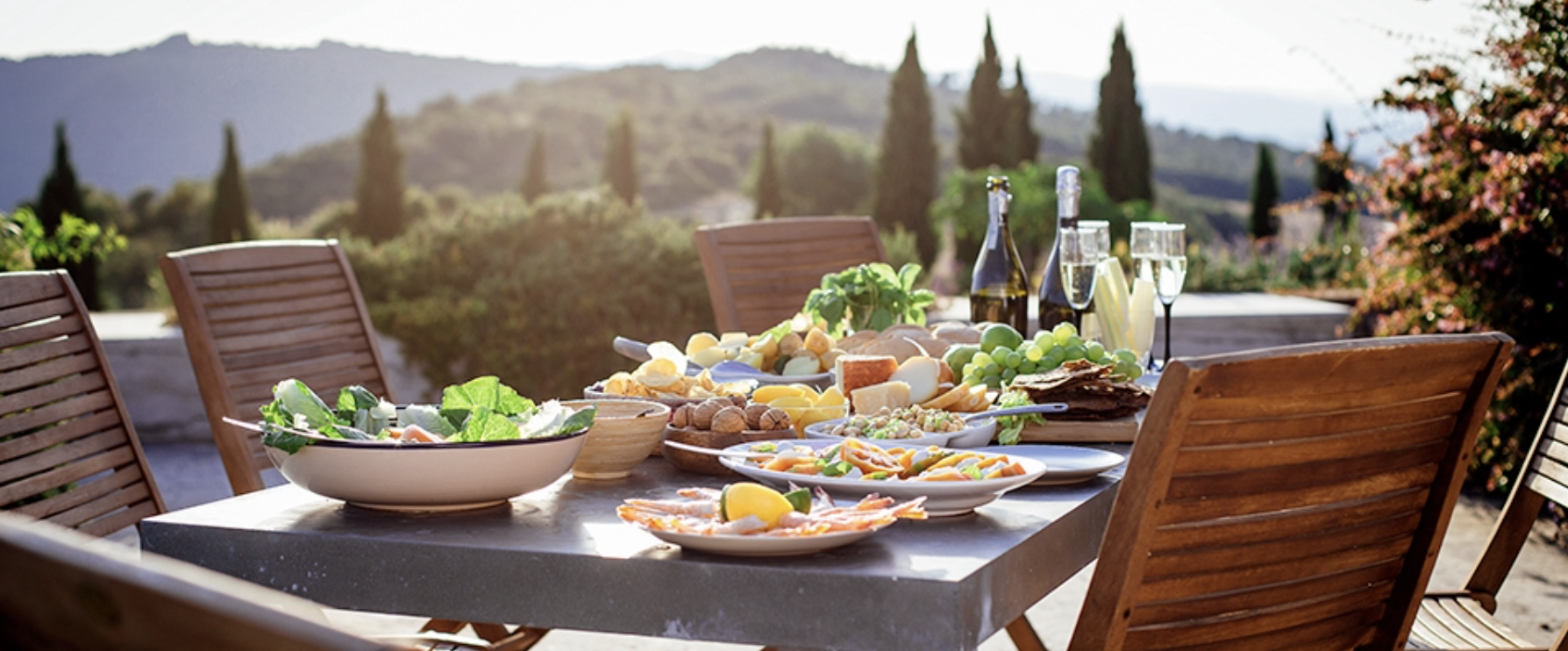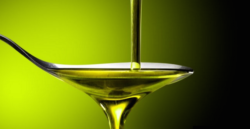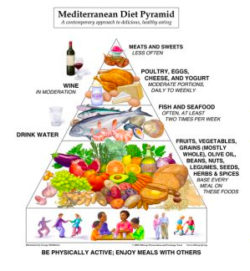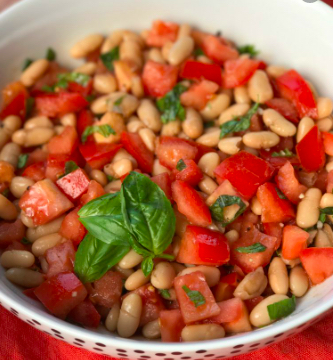Katherine’s Silver Lining Approach: Your Mediterranean Diet Pantry & Featured Recipe

What science has discovered as the ideal diet hasn’t changed for more than half a century. What we’ve learned since then, though, are why and how the diet is so perfect. It’s worth making the switch, for many reasons! For one, it boosts your body’s immune system dramatically, thus, its ability to fight diseases from colds to flu, cancer, heart disease, diabetes, arthritis, Alzheimer’s, even today’s scourge: COVID.
The Mediterranean Diet is a complex diet containing many foods that contribute to its health benefits. It’s plant-based, high in vegetables, fruits, legumes, whole grains, nuts, seeds, fish, low-to-moderate in high fat dairy and red meat (very low in saturated – animal – fat) and the occasional glass of wine. Olive oil is the diet’s principal source of fat.
It was first observed in the 1950s by nutrition scientist, Ancel Keys, that people in Greece, southern Italy, southern France and other countries bordering on the Mediterranean, eating their local food, experienced few nutritional problems and rarely suffered from heart disease. Since then, many studies have confirmed that this mixture of foods we now call the Mediterranean diet has significant properties which may help prevent not only heart disease, cancer, diabetes, Alzheimer’s, dementia, arthritis, many of the diseases of aging, and even weight gain.
While every element in the Mediterranean diet is important, eating fresh,  extra-virgin olive oil may trump everything. The type of fat you eat is critical to your health. This is because fat ends up in all of your body’s cells. It acts as a cell lubricant, improves flexibility and communication between cells, and is important for cell metabolism and gene expression. If the fat you eat is saturated – solid at room temperature – as in butter or animal fat – this decreases cellular flexibility and functioning. So, following the Mediterranean diet, but eating the wrong kind of fat, could reduce your health benefits.
extra-virgin olive oil may trump everything. The type of fat you eat is critical to your health. This is because fat ends up in all of your body’s cells. It acts as a cell lubricant, improves flexibility and communication between cells, and is important for cell metabolism and gene expression. If the fat you eat is saturated – solid at room temperature – as in butter or animal fat – this decreases cellular flexibility and functioning. So, following the Mediterranean diet, but eating the wrong kind of fat, could reduce your health benefits.
Olive oil, the staple of the Mediterranean diet, is unique in many ways. First, it’s made from a fruit which is exposed to the elements. This exposure forces olives to synthesize antioxidants and anti-inflammatory nutrients to protect themselves and concentrates the valuable nutrients in the oil, which is high in compounds called polyphenols, Vitamin E and carotenoids, like beta-carotene. New research shows high polyphenol olive oil turns OFF genes that cause the metabolic syndrome, the constellation of high blood pressure, blood sugar and cholesterol.
Polyphenols are also found in wine, tea and cocoa and are known for protecting the heart in many ways – reducing blood clotting, lowering bad (LDL) cholesterol, raising good (HDL) cholesterol and lowering blood pressure. Vitamin E is a well-known antioxidant which helps prevent oxidation and cellular aging and may help prevent diseases such as cancer. Caretenoids are plant compounds giving the olive its color. They’re important for your immune system, your skin, your vision, bones, reproduction, and may reduce cancer risk. Olive oil is also high in heart-healthy monounsaturated fatty acid called Oleic acid.
 Eating the Mediterranean diet is the most economical way to eat. In fact, it is a diet borne of poverty. The original Mediterraneans, who ate the purest form of the diet in the 1950s and 60s, ate mostly fruits, vegetables, whole grains, nuts, seeds, legumes, fish, and olives, all of which were local. This is all they could afford and it happened to be the healthiest diet on the planet. They were also quite thin and naturally very active in their regular routines. All of these factors contribute to its health benefits
Eating the Mediterranean diet is the most economical way to eat. In fact, it is a diet borne of poverty. The original Mediterraneans, who ate the purest form of the diet in the 1950s and 60s, ate mostly fruits, vegetables, whole grains, nuts, seeds, legumes, fish, and olives, all of which were local. This is all they could afford and it happened to be the healthiest diet on the planet. They were also quite thin and naturally very active in their regular routines. All of these factors contribute to its health benefits
Olive oil’s beneficial health properties, its polyphenol content and acidic pH, degrade over time, as days, weeks, and months go by after harvest. Other factors play a role, too: the harvesting method, the age of the trees, the ripeness of the olives, the processing, and the storage. Since time, heat, and light affect polyphenol content, choose olive oil that:
- Is no more than one year old (look for the harvest date – not a sell-by date – on the label),
- Is in an air-tight, dark glass, or tin container,
- Is stored in a cool environment, and
- Smells and tastes like olives, which could be fruity, grassy, or peppery.
The Mediterranean Diet pantry
This is the perfect way of eating during our collective isolation. It’s inexpensive and most foods can be dry, frozen or canned, when fresh aren’t available, which is the case this time of year. Some examples:
- Canned chopped tomatoes, or any frozen fruits and vegetables
- Dry or canned beans, peas, whole grains such as bulgur, barley, oats, canellini beans, black beans, lentils, chick peas,
- Nuts and seeds
- Fresh lemons, and citrus fruit or vinegar, and olive oil for salad dressings, canola oil for cooking with high heat,
- Fresh onions, garlic, and root vegetables when available,
- Canned wild Alaskan Salmon, herring, anchovies, sardines,
- Whole wheat breads, pasta, crackers and cereals
- Dry or fresh herbs and spices such as basil, rosemary, marjoram, thyme, oregano,
- Yogurt, enough to eat daily for its natural probiotic benefits,
- Cheeses such as Mozzarella, Ricotta, with small amounts of Parmesan and Reggiano.
- Eggs
Katherine’s White Beans with Garlic and Basil
Excerpted from Diet Simple by Katherine Tallmadge, MA, RDN, LD
This is the perfect Mediterranean recipe. My friends love these beans. I love these beans. They’re always a hit. Every time I serve them, I’m asked (begged) for the recipe. They taste deceptively rich and are easy to make. The abundance of fresh basil added at the end fills the house with irresistible aromas. This is a warm and satisfying dish which can be eaten in many ways. My friend David uses them as a dip (what can I say, he`s a shrink and a priest!). My (very healthy) friend Alan loves them so much he eats them for breakfast! I bring them to potlucks.
I love to fill a large plastic container with them in the frig, ladle a heap into a microwave-safe bowl, and heat them up for lunch along with a slice of hearty whole grain bread topped with smoked turkey, salmon, light cheese (or all of the above) – and some crunchy lettuce. One of our favorite ways to eat these beans is with spicy chicken sausage. Just slice a spicy chicken sausage of your choice into a microwave-safe bowl, smother with the beans and pop in the microwave. Together with a greens salad and a tart dressing, you’ve got a winning combination.
I usually double the recipe so I have plenty of servings during the week. Without any meat, it’ll last more than a week in the frig.
4 servings
Ingredients:
1/2 pound dried small white (cannellini) beans, or 24 oz. canned rinsed bean
1 Tbsp Olive Oil
1-1/2 Onion, Chopped
4 Garlic Cloves (more or less to taste)
1 Quart defatted Chicken or Vegetable Stock (only 2 Cups if using canned beans)
Salt and pepper to taste
12 Oz. (3 medium) fresh or canned Tomatoes, drained, peeled and chopped
1 Large Handful of Fresh Basil
Juice from 2 to 4 Lemon (1/4 to ½ cup)
Freshly Ground Pepper, to taste
Directions:
If you’re using dried white beans:
Soak the beans in one quart of water overnight or up to 24 hours. Drain and rinse. Add one quart Chicken Stock (or more if you like the dish more soupy) to the beans along with one clove of garlic and 1/2 onion. Bring to a boil, reduce heat, cover, and simmer 1-1/2 hours or until the beans are almost tender. Add more water or stock to keep moist. Add salt to taste and finish cooking until beans are tender.
Continue with your cooked dried beans or start here if you’re using canned white beans:
Heat the oil in a large, heavy soup pot or casserole and sauté the remaining one onion and garlic over low to medium heat for 10 or 15 minutes or until soft and caramelized. Add the tomatoes, and more salt to taste and bring to a simmer. Simmer about ten minutes then add the beans with their cooking liquid and simmer 15 – 20 minutes. If you used canned beans, use enough stock to keep the beans moist while cooking. At the end of the cooking time, add the fresh basil (it will get bitter if overcooked), fresh lemon juice, and freshly ground pepper. Mix together.
You can also add greens to this dish for more authentic Mediterranean flavors and nutrition.
For more fabulous tips and simple, effective ways to lose weight,
buy her book, Diet Simple!











